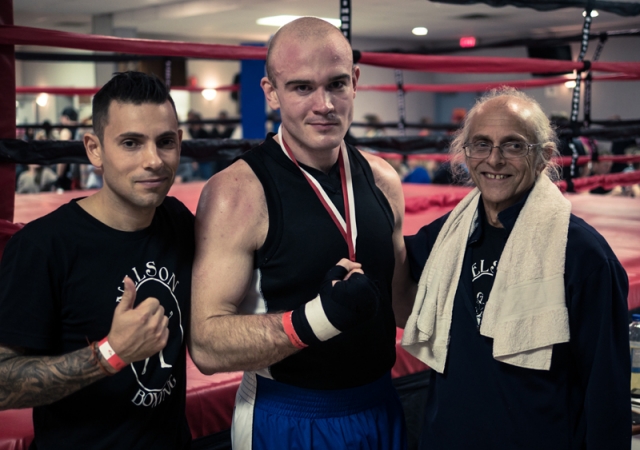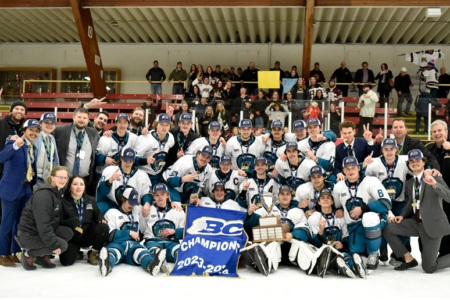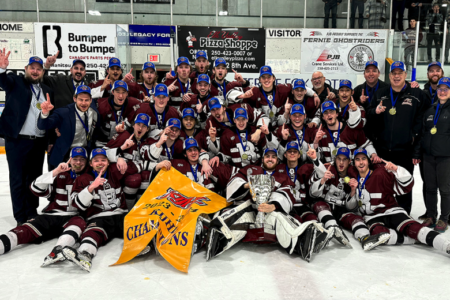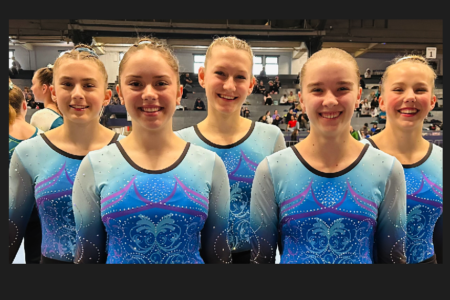Louis Bockner documents inaugural fight of Nelson Boxing Club's Jacob Rudkoski
By Louis Bockner
More than 200 people recently flocked to the Eagles Hall in Cranbrook to take in the second annual Eagles Boxing Club’s Charity Challenge.
Nelson boxer Jacob Rudkoski was one of the fighters on the card, jumping into the ring for the first time.
Louis Bockner was one of the 200 fight fans watching with anticipation as Rudkoski realizes his dream to box in a sanctioned event and writes this account of the Nelson Boxing Club inaugural taste of the sport.
My first memories of Jacob Rudkoski are found on baseball diamonds and are preferable to the ones that came after on football fields. I consider myself lucky to have escaped the meetings of our rival high schools unscathed and now, after watching his performance as a boxer, I am forever indebted to John “Jack” Broughton who, in 1743, created weight divisions, ensuring Rudkoski and I will never be re-united in the ring.
Rudkoski joined coach Jesse Pineiro and assistant coach Peter Bockner at the Nelson Boxing Club in May after several years of training as a Mixed Martial Arts (MMA) fighter, a move instigated by a desire to refine his skills.
Unlike MMA, which combines multiple fighting disciplines, he feels boxing allows him to focus on one aspect while leaving the kickboxing, wrestling jiu jitsu and muay thai in their respective fields. Now, six months later, we’re somewhere between Yahk and Cranbrook on our way to his first fight.
The talk in the car centers on boxing — this fighter versus that fighter, the match ahead and the training behind. As the Nelson club’s only heavyweight he rarely finds anyone on par to spar with, a fact he believes has made him a better fighter.
“Even training in MMA I rarely met guys my size,” he says. “It makes you work on speed, it makes you faster.”
The Weigh In
In the basement banquet room of Cranbrook’s Sandman Hotel he strips to his underwear for the weigh in. Tipping the scale to a modest 102.1 kilograms he carries his weight lightly on legs like telephone poles. Even his head is big with a heavy-set brow and his hands resemble toaster ovens.
As the room fills with people — fighters, coaches, mothers, fathers and more — glances dart around the room, hoping to discern prospective opponents. All Pineiro or Rudkoski know about his man is that he’s from Calgary and is about 100 kilograms.
This narrows the field considerably as most of the fighters sitting in the lineup to see the doctor are in their teens or younger; a sign that boxing is still alive in Canada despite competition from the ever popular Ultimate Fighting Championship and major sports like soccer and hockey. Some are lanky, some are round, some are silent, some are laughing and some look simply scared.
As the doctor shines his flashlight in the pupils of a young man with a “Lethbridge Boxing Club” T-shirt the voice of Bill Watson, one of the Cranbrook Eagles Boxing Club coaches, cuts through the murmurs.
“Can I have everyone’s attention?” he asks. “If you’re fighting in the blue corner you get changed and ready in the basement. If you’re in the red corner there’s a cube truck in the parking lot.”
Cornerman and Trainer, Jesse Pineiro
‘At dinner the advice from coach to fighter begins to flow.
“What I really want you to do is keep your hands up and finish with the left,” Pineiro says. “Do it religiously. That left brings you back defensively.”
Use your punches. Nice and long and remember, keep your left up.”
Although Pineiro’s amateur career record (10-5) is “kind of underwhelming” he carries with him a wealth of knowledge acquired through sparring with, and learning from, world-class fighters and coaches all over the world.
In the early 2000’s he brought that knowledge back to his hometown of Nelson — a city whose once vibrant boxing community was all but extinct.
“In Nelson we’re building it from nothing,” Pineiro says. “[People] have no idea about boxing and they have little interest.”
A point he and fighters like Rudkoski are hoping to change.
“It’s a good thing to get into,” says Rudkoski. “It’s character building.”
When asked about the violence aspect he shakes it off.
“It’s a sport. We’re not here to kill each other. Tell me that a six minute boxing match this weekend is going to do more damage than my buddies partying tonight.”
In the bathroom of the restaurant I ask Rudkoski how he’s feeling, curious if his calm demeanor is hiding a nest of butterflies. After all, it is his first fight.
“I feel good,” he says. “I’ve definitely got a bit of the nervous feeling but that’s just because I’m competitive. I get nervous before a chess match. It’s good. It keeps you sharp.”
Rudkoski prepares to enter the ring
The second annual Cranbrook Eagles Boxing Club’s Charity Challenge is held in, where else, the Eagles Hall — a legion-like room filled with enough chairs and banquet tables to seat over 200 people.
At one end volunteers are putting the finishing touches on the raised ring while at the other a stuffed Golden Eagle in a glass case presides over the action. Near the taxidermy watcher Rudkoski sits as Pineiro wraps his hands.
The wrap is done in silent ceremony. A curt nod of approval from Rudkoski is all that is given after the completion of each fist followed by a mock hit into his palm. Satisfied coach and fighter rise along with the anticipation.
Now people are filing in. Now the bell rings. Now the fights begin. The “thwack, thwack” of gloves on flesh is mirrored by fighters warming up in corners and alcoves around the room hitting pads with coaches.
There is no animosity here. No intimidation or verbal aggression. Only a sense of a show, in this case put on to raise money for families in need. At the first Charity Challenge they had hoped to raise $5,000. Instead they raised $20,000.
Fighters dressed in blue and red move through the crowd either in anxious, pre-fight wanderings or in post-fight glory. Even the defeated seem content, showing little signs of disappointment. After every battle there is a hug of recognition.
“Respect is given all around,” Bockner tells me,” because everyone knows how hard it is.”
Rudkoski is scheduled to fight tenth. His opponent, a tall, broad-shouldered man named Tyler Crew from the Southpaw Boxing Gym in Calgary, is dressed in blue trunks and sports a Mohawk.
Somewhere between the seventh and eighth fight they disappear to the basement to warm up. Pads are pummeled as the final words of advice are given.
“Be fast, be relaxed,” Pineiro tells him. “Basic stuff. It’s gonna be good.”
Seventy-five seconds later the boxing match is over
As the bell rings, Rudkoski moves almost gracefully from the red corner. The pace is different than most of the previous fights. There is no rush. They both seem to say, there is time. And then the blows begin to land.
A gasp escapes from the crowd as Rudkoski lands a bone crushing shot on Crew’s shoulder, missing his head by inches. The next one finds its mark, Crew’s head snapping back as he stumbles into the corner. Rudkoski hesitates and in that moment the referee steps in, ushering Crew to the corner as blood streams down the left side of his face.
The doctor is summoned and after two white medical pads are turned crimson he shakes his head. Seventy-five seconds after the opening bell the fight is stopped due to a technical knock out by injury. Rudkoski looks almost disappointed. The bubble of anticipation has burst and his record is officially 1-0.
Great first fight, but now it’s time to train for the next one
Outside the car rain hammers down with tropical intensity, inside the victorious fighter once again appears calm.
“It’s funny,” he says, “you do all that paperwork, you train for months and drive all that way and then it’s over in 75 seconds.”
As with most things in life, there is an ebb and flow to boxing. Moments of intense, adrenaline-fueled action are interspersed among long periods of training, waiting and anticipating.
Unlike other sports there is no season or pre-season. There are no playoffs and no World Series. There is only the fight. And again, like life, it is often over before you fully realized it had begun.
“Great job and have a good weekend,” Pineiro says as Rudkoski goes his separate way, “I’ll see you Monday.”
A days rest is all he will get before the work begins anew. There will be no coddling or ego stroking, no time off to relish his achievement and none is expected.
With the next fight already on the horizon the coach will ask for everything the fighter has and the fighter will oblige.



























